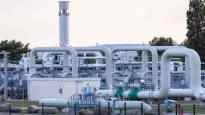The winter gas shortage could plunge Europe into recession, which would also directly affect the Finnish economy. Today, the energy ministers of the EU countries will decide on natural gas emission reductions.
13:00•Updated 13:03
Today, Tuesday, the energy ministers of the EU countries will decide on the means to prepare for the looming gas crisis in the winter.
According to preliminary information, the EU countries are in the process of accepting the Commission’s proposal, according to which member countries will be set a voluntary 15 percent gas consumption reduction target.
The reduction target comes into effect in August and continues until the end of March next year. However, exemptions are being granted to several member countries because they have not imported natural gas from Russia.
If necessary, the target could be made mandatory by EU decision if Europe’s gas reserves threaten to run out.
found out the answers to five essential questions about the gas crisis.
1. How did we end up in a situation where the use of natural gas must be reduced?
Europe is threatened by an energy crisis due to the war in Ukraine.
The reason is that several European countries, such as Germany, Austria, Hungary and Italy, had made themselves dependent on Russian energy before the war.
The Russian state company Gazprom, which supplies gas, has already significantly cut and even completely stopped gas deliveries to several European countries.
Gazprom has explained supply interruptions with technical difficulties, among other things, but in Europe they have been interpreted as Russia’s way of blackmailing the EU.
So far, gas transports have continued along the important Nord Stream 1 gas pipeline for Germany, except for a few maintenance interruptions. However, the fear is that Gazprom could cut off gas supplies completely.
Then some EU countries would face difficulties in the winter, especially if the winter was exceptionally cold.
The EU’s goal is to fill the member countries’ gas reserves in order to avoid a deep energy crisis in the winter.
2. Why exactly do you want to save on natural gas?
European countries depend specifically on natural gas, because it is difficult to find replacement energy sources quickly enough.
In the short term, for example, increasing coal-fired power is one way to fix the shortage of natural gas for heating. Among others, Germany, Italy and the Netherlands have already decided to temporarily increase their coal power capacity, which was being reduced due to climate reasons.
EU countries have also tried to look for alternative sources of gas. For example, new gas fields have been opened in the Netherlands. In addition, relief has been sought from liquefied LNG gas.
However, the measures will not be enough if the gas reserves cannot be filled and Russia cuts off gas supplies.
In that situation, household gas needs would be prioritized and industrial production would be reduced.
3. Why do you want to decide on saving natural gas on an EU-wide basis?
The gas networks of European countries are interconnected.
Countries dependent on Russian gas need solidarity from other member states in a situation where Russia would cut off gas supplies completely.
For example, Holland has already committed to help Germany if natural gas in the neighboring country threatens to run out completely in the winter.
Member countries that are less dependent on Russian energy must have enough gas in savings so that when a gas crisis hits, they would be able to supply gas to the EU countries in need.
If gas has not been saved enough, some member countries could have to reduce their own production while helping their neighbors.
It is also about the common interest of all EU countries. It is feared that the gas crisis will plunge the entire European economy into recession if joint preparations are not made for it.
4. Which countries are in a particularly vulnerable position?
The Czech Republic, Slovakia, Germany, Austria, Hungary and Italy are particularly dependent on Russian gas.
Hungary’s authoritarian prime minister Viktor Orban has so far been able to agree on the continuation of gas deliveries from Russia.
In Europe, eyes have turned above all to Germany, because its economic importance is so great.
Germany also has a great symbolic meaning, because it sought to deepen its energy cooperation with Russia right up until the start of Russia’s large-scale war of aggression.
A campaign to save energy and natural gas has already started in Germany. Households and industry are encouraged to save on their own. In addition, for example, we want to dim the street lighting.
Some EU countries, such as Ireland and Malta, have not imported natural gas from Russia at all.
5. How does the gas crisis affect Finland?
In Finland, gas imports from Russia stopped already in May. That is why we already know how to prepare for the gas crisis.
In Finland, natural gas corresponds to five percent of the total energy consumption.
The use of natural gas has already started to be reduced, and replacement sources have been sought. The EU’s gas reduction goals do not apply to Finland.
Finland has also leased a floating LNG gas terminal, i.e. an LNG ship, with Estonia. LNG gas can be transported in tankers, and there is no need to build gas pipelines and pumps for it like normal natural gas.
If the LNG terminal arrives on time, Finland’s and Estonia’s gas supplies should be secured.
Europe’s gas shortage can be seen most concretely in Finland in energy bills. In addition, the contraction of the German economy and Europe’s drift into recession would directly affect the Finnish economy.
